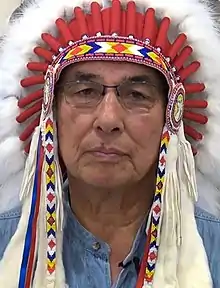Willie Littlechild | |
|---|---|
 Littlechild in 2017 | |
| Member of Parliament for Wetaskiwin | |
| In office 1988–1993 | |
| Preceded by | Stanley K. Schellenberger |
| Succeeded by | Dale Johnston |
| Personal details | |
| Born | J. Wilton Littlechild 1 April 1944 Hobbema, Alberta, Canada |
| Political party | Progressive Conservative Party of Canada |
| Spouse | Helen Peacock[1] |
| Children |
|
| Alma mater | University of Alberta |
| Signature | |
J. Wilton Littlechild CC AOE MSC KC (born 1944), known as Willie Littlechild, is a Canadian lawyer and Cree chief who was Grand Chief of the Confederacy of Treaty Six First Nations and a member of Parliament. A residential school survivor, he is known for his work nationally and internationally on Indigenous rights. He was born in Hobbema, now named Maskwacis, Alberta.
Early life and education
Wilton Littlechild was born on 1 April 1944 in Hobbema, Alberta. He was brought to residential school at the age of six, spending 14 years in the system until his completion of high school.[2][3] He witnessed and experienced abuses during that time.[3]
As a young man, he was a successful athlete who won ten Athlete of the Year Awards. He graduated with a Bachelor of Physical Education degree in 1967,[4] then obtained a master's degree in physical education from the University of Alberta in 1975.[5] During his time in university, he played on the hockey and swimming teams.[4] He later became the first status Indian from Alberta to obtain a law degree, which was earned at the University of Alberta in 1976.[5] That year, the Cree Nations bestowed him with a headdress as an honorary chief and endowed him with his grandfather's Cree name, Mahihgan Pimoteyw, which means Walking Wolf.[3]
Career
Littlechild was a member of the 1977 Indigenous delegation to the United Nations and worked on the UN's Declaration on the Rights of Indigenous Peoples.[2] He won the national Tom Longboat Award in 1967 and 1974,[6] and was one of the founders of the North American Indigenous Games, begun in 1990, Edmonton, Alberta. He has also consistently advocated for the creation of the World Indigenous Games, which provides competitive events for Indigenous athletes from around the world.
Littlechild was the Progressive Conservative Party of Canada Member of Parliament for Wetaskiwin from 1988 to 1993.[7] Littlechild did not stand for re-election in the 1993 general election. After leaving Parliament, Littlechild continued to be involved in politics. He was the founder of the International Organization of Indigenous Resource Development, a United Nations non-governmental organization.
Littlechild is a member of the Ermineskin Cree Nation. The Indian Association of Alberta presents the Willie Littlechild Achievement Award to six First Nations students each year.
Littlechild was made a member of the Order of Canada in 1998 and was promoted to the rank of Companion in 2023.[8] In 2006, he was the recipient of the Distinguished Service Award of the Canadian Association of Former Parliamentarians,[9] awarded for "outstanding contributions to the promotion and understanding of Canada's parliamentary system of government".[10]
In 2009, Littlechild was appointed as a commissioner to the Truth and Reconciliation Commission of Canada where he served for six years until the commission's final report and dissolution.[11][3][12]
Littlechild received the Indspire Award for law and justice in 2015. On 30 November 2016, he became Grand Chief of the Confederacy of Treaty Six First Nations, becoming the first "non-sitting" chief to hold the position, and subsequently served for three years.[13] In 2018, he was inducted into the Canada's Sports Hall of Fame.[14] In 2019, Littlechild won the Pearson Peace Medal.[15] During Pope Francis' visit to Canada in 2022, Littlechild presented the Pontiff with a traditional Indian headdress, generating mixed reactions from the Indigenous community.[16]
See also
References
- 1 2 "Meet the Commissioners". Truth and Reconciliation Commission of Canada. Retrieved 13 December 2020.
- 1 2 "Biography - Wilton Littlechild - Speak Truth to Power Canada". sttpcanada.ctf-fce.ca. Retrieved 12 December 2020.
- 1 2 3 4 "Wilton Littlechild". www.alberta.ca. Retrieved 12 December 2020.
- 1 2 "Willie Littlechild". Lieutenant Governor. Retrieved 26 March 2017.
- 1 2 "Mr. Wilton Littlechild" (PDF). www.un.org. Retrieved 10 March 2017.
- ↑ Forsyth, Janice. Defining the Tom Longboat Awards, 1951–2001. PhD dissertation, University of Western Ontario, 2005, p. 10.
- ↑ Willie Littlechild – Parliament of Canada biography
- ↑ "Mr. J. Wilton Littlechild". Governor General of Canada. Archived from the original on 28 December 2023. Retrieved 28 December 2023.
- ↑ Canadian Association of Former Parliamentarians, Remarks of J. Wilton Littlechild in the Senate of Canada, 5 June 2006, on the occasion of receipt of the Distinguished Service Award, Canadian Association of Former Parliamentarians. Retrieved 19 March 2011.
- ↑ Canadian Association of Former Parliamentarians, Distinguished Service Award Archived 6 July 2011 at the Wayback Machine. Retrieved 19 March 2011.
- ↑ "The commissioners for native reconciliation". CBC News. 10 June 2009. Archived from the original on 26 June 2013. Retrieved 13 December 2020.
- ↑ Copley, John (16 June 2015). "Chief Wilton Littlechild: Truth and Reconciliation Commission was a life-changing experience". Alberta Native News. Retrieved 13 December 2020.
- ↑ "Wilton Littlechild officially accepts position of Grand Chief of Treaty Six Nations". Alberta Native News. 5 December 2016. Retrieved 12 December 2020.
- ↑ "2018 Induction Celebrations". Canada's Sports Hall of Fame. Archived from the original on 29 April 2018. Retrieved 28 April 2018.
- ↑ "The Pearson Peace Medal Recipients". United Nations Association In Canada. Retrieved 3 June 2019.
- ↑ Thompson, Darren (25 July 2022). "Indian Country Responds to Pope Francis Receiving a Headdress During 'Pilgrimage of Penance'". Native News Online. Retrieved 22 August 2022.